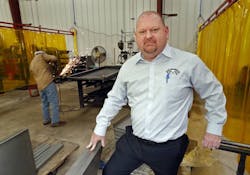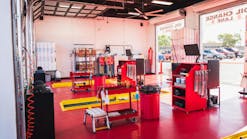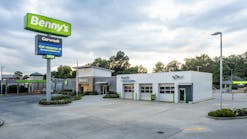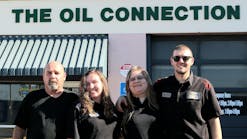Devon Lube Executive Q&A with Kelly Lykins: Former Retail Exec Welcomes New Challenge
Pull into a Jiffy Lube, Valvoline or any other quick oil change shop and odds are much of the fixtures were provided by Oklahoma City-based Devon Lube. The 28-year-old company dominates the industry worldwide with customers as far away as Africa, Mexico, Canada and China.
“We've mainly ramped up the services side of our business for new oil-change stores,” Lykins said. “We have a turnkey operation. When we leave, customers are ready to pump oil.”
From Devon's 38,000-square-foot facility at 7510 Melrose Lane, Lykins, 41, sat down with The Oklahoman on Tuesday to talk about his life and career. This is an edited transcript:
Q: Tell us about your roots.
A: I grew up north of McAlester in Crowder, where I graduated in a class of 46. My father commuted to Muskogee, where he ran an area UPS office. When I was 13 or 14, he bought a convenience store close to home that he owned for 15 years. When I started elementary school (I'm the youngest of three boys), my mother went to work for Crowder Public Schools as secretary to the principal. Today, my parents are retired and still live in Crowder. One of my brothers lives in McAlester, and the other in Texas.
Q: What was your thing growing up?
A: If I wasn't playing baseball or basketball, I was fishing and hunting. We lived on lake land. My first job was working at my dad's convenience store. Then — so I wouldn't have to work for my dad (he was pretty strict) — I got a job mowing, before sunrise, at Arrowhead State Park Golf Course; a job that I held for years and that helped me pay for college.
Q: How did you meet your wife?
A: She's from McAlester, and we met in a Hardee's parking lot when we were 16. I knew I was in trouble when I met her. Seriously, when I got home that night, after midnight, I told my parents that I'd met somebody very special. Meanwhile, she went home and told her parents the same thing.
Q: And college?
A: I was awarded a baseball and academic scholarship to Murray State College in Tishomingo. I was recruited by Pepperdine, Northeastern in Boston, and elsewhere. But I was in love, and Tishomingo was affordable for Beth. We married after Murray State at age 20, and I finished at Northeastern State in Tahlequah, but didn't play ball there. As a third baseman, I'd injured my throwing arm.
Q: You and Beth became parents early in your marriage. Was that the plan?
A: No, but we were good with it. Meanwhile, after we had our first son, we suffered through four or five years of infertility, before we decided to apply to adopt through Catholic Charities. Then, Beth — 16 months later, at Infant Crisis Services where she works — was approached by an expectant single teen mom about adopting the child she was carrying. So we went that route. Coincidentally, Catholic Charities called us two weeks before our younger son was born about having a baby for us, but we passed on that baby.
Q: What were the highlights of your early career?
A: Following graduation, I joined Boca Raton, Florida-based Office Depot and worked 14 months as assistant manager for a store on north May, before managing a new store in Muskogee for 18 months. Of course, this was pre-Amazon.com and it was very fun meeting the unique furniture, computer and other needs of different businesses. I came back to the north May store I trained in, which was selling more than $20 million annually, and ran it for two and half years, before being promoted to district manager — the youngest ever companywide at that time — over the Oklahoma and Arkansas territories for six-plus years. The last several months with the company, I managed special projects from Boca. But when I could see Office Depot was beginning to struggle with internet competitors, I began looking for other opportunities and found one as director of operations for Portland, Oregon-based Aspen Dental. I managed thousands of employees, from the Mississippi River to California, and 300 locations, which offered everything from dental cleanings to dentures. Business was gangbusters, but I left before two years.
Q: Your wife and you were thrown a major life curve, which spurred you to leave Aspen Dental and join Pittsburgh-based Dick's Sporting Goods. Tell us about it.
A: Beth, when Ryder was only a toddler, was diagnosed with stage three breast cancer. There was no way that I could continue to be on the road three to four days a week; Beth had no stamina throughout her yearlong surgery and treatment and needed me here. It was scary, and taught me never to take life for granted and love the ones who love you. I was mostly home the nearly four years that I worked as a district manager for Dick's, overseeing 18 stores here, in Tulsa, Dallas and Wichita.
Q: Are there any similarities between the retail and manufacturing sectors?
A: Yes. I've lived in 26 states, mainly in the Northeast and Northwest, if you count the states where I was stationed for a month or more. I've learned people are people. You just have to hire the right ones and put them into the right situations to make you successful.
This story, by Paula Burkes, first appeared on newsok.com





